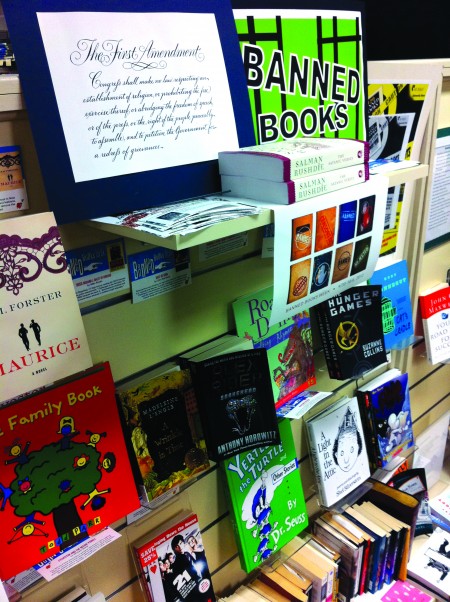
Murray State, for the last three years, has taken part in a national event which aims to eliminate censorship entirely.
What started as a banned book display in the University Bookstore became an entire wall devoted to standing against oppression.
Banned Books Week, a national celebration of the freedom to read, stresses the significance of free and open accessibility to all information.
Hundreds of libraries and bookstores nationwide lure the attention of its citizens to the drawback of censorship, by publically displaying challenged books. These books include materials that are deemed by some as unorthodox, unpopular, vulgar or repulsive.
A challenge is an attempt to remove or restrict materials, based upon the objections of a person or group for certain moral-based reasons. It is not a mere expression of an opinion, it is an active attempt to remove material from public access.
Due to Banned Books Week and the commitment of free thinkers, most challenges are unsuccessful and most materials retained for public access.
According to the American Library Association, the vast majority of challenges to books are initiated locally by parents, more often than not, to protect their children. Donna Witherspoon, bookstore assistant of the University Bookstore, said she started the banned book shelf three years ago to make clear that everyone has the right to read whatever they want.
“If you allow anyone to tell you what you can or cannot read,” she said, “you’re giving them permission to take away your rights. If you give in on this, what’s next? You could lose all of your rights one-by-one.”
The 2012 celebration of Banned Books Week started Sunday and will end Saturday; this year marks the event’s 30th anniversary.
“The week isn’t necessarily all about the seriousness,” she said. “It’s simply knowing and enjoying your right to read whatever you may choose.”
The week drawing criticism to censorship was started in 1982, in response to a sudden surge in the number of challenged books worldwide.
More than 11,300 books have been challenged since 1982 and, according to the American Library Association, there were 326 challenges reported to the Office of Intellectual Freedom in 2011 alone.
In the last 10 years, hundreds of books have been challenged – many of which were required for students to read – in primary, intermediate and secondary schools.
Some of the most famous and noteworthy cases of challenged books include childhood favorites such as the “Harry Potter” series, “Bridge to Terabithia,” “The Great Gatsby,” “Yurtle the Turtle” and “The Adventures of Huckleberry Finn.”